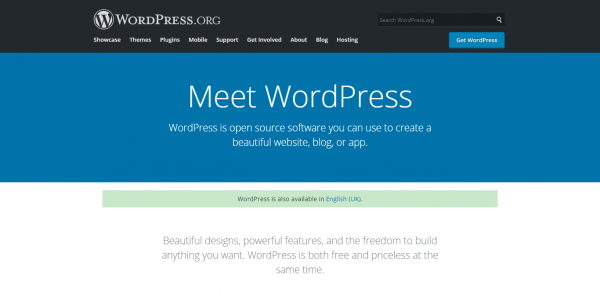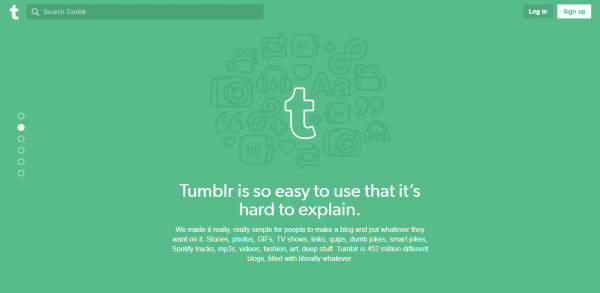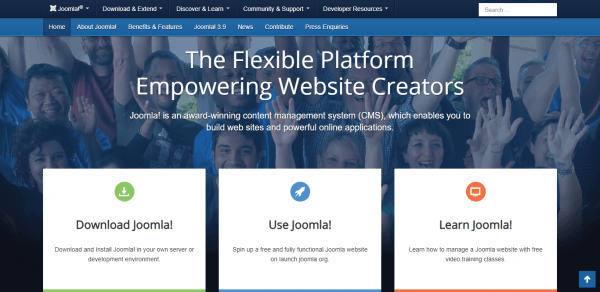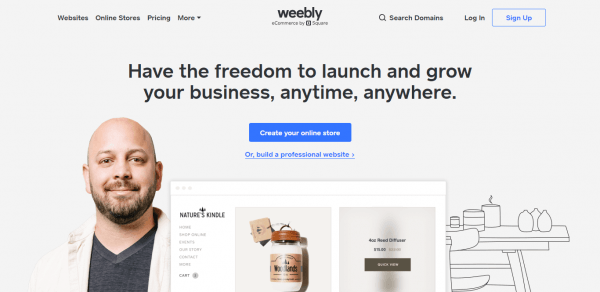Did you know, as many as 86% of B2B companies blog- and for a good reason, it gets results! Websites with blogs have as many as 434% more indexed pages in comparison to brands that don't.
The stats speak for themselves. If your business isn't producing content, it should be.
Therefore, if you're looking for the best blogging platforms, you're in the right place. We understand picking the right one for your business is a tough choice- there are so many to choose from!
Luckily for you, we're exploring the most popular blogging platforms here in this article- so you can make an informed decision. Let's dive in!
Table of contents
What's a Blogging Platform?
In short, it's a service or app that enables the user to publish content on a web page. Typically, blogging platforms are content management systems that double as website builders.
If you're looking for somewhere to post informative content for your audience to enjoy, a blogging platform is an ideal solution for you!
Are You New to Blogging?
If you're new to blogging, you’ll need a platform that’s user-friendly, easy to set up, and doesn’t require any coding.
As you make your decision, think about what you want from your blog, i.e., how will content creation bring you closer to your overarching business goals? Also, what kind of content do you want to publish- videos, written blog posts, infographics, etc.?
Once you have these answers, you'll have a better idea of the kind of service you require.
Top Tip: As your business grows, you may want to change your blog's aesthetic. Consequently, you'll need a blogging platform that provides features to facilitate a growing audience. So, opting for software that gives you that flexibility is always a good idea.
With that in mind, here's a list of our favorite blogging platforms for newbies.
Best Blogging Platforms for Ecommerce Stores
1. WordPress.org

This platform ranks number one on our list. After all, it's the world’s most popular blogging platform. It powers as many as 24% of all sites on the web! That’s almost one-quarter of all the live websites up and running!
In short, WordPress.org is a free, open-source platform. It enables you to create a blog on your own terms- i.e., you have complete ownership of your blog. So, you can add extra features to complement the needs of your blog as and when it expands.
By open source, we mean you can play around and modify the coding. However, you’ll need some coding skills (or the funds to hire a web designer) to take advantage of all this flexibility.
WordPress.org is a fabulous option for those with a few technical skills. It's the ideal solution for business owners looking to develop, run, and manage a more elaborate blog over the long run.
One of the best things about WordPress.org is all the free themes. These are amazing for helping you design your blog and for showcasing the aesthetic of your brand.
You can also access over 45,000 free plugins! These are incredible for adding features to improve the elements, design, and interactivity of your blog and consequently enhancing user experience.
Last but not least, you can optimize all your content for SEO (search engine optimization), which makes WordPress.org a fabulous choice if you're looking for an SEO-friendly blogging platform.
SEO is essential for getting your blog to organically rank higher on search engines like Google. Needless to say, this is a handy method for gaining more traction!
Top Tip: Don't confuse WordPress.org for WordPress.com- the two platforms are vastly different from one another.
The main disadvantage to WordPress.org is learning how to navigate the dashboard- this can take a bit of getting used to! You'll also have to handle your own security and backups– so do your research and ensure you've covered both these bases.
Unfortunately, while WordPress.org is free to use, you'll have to shell out for a custom domain name, hosting, and security- these add-ons can rack up. Again, sorting out these aspects of your blog can be a tad overwhelming for bloggers who aren't tech savvy.
When it comes to web hosting, Bluehost is probably your best bet. They provide a one-click integration with WordPress.org- how awesome is that?! Plus, their deals on domain names are undoubtedly worth checking out!
Top Tip: Head to YouTube and search for tutorials on how to get web hosting. Buying all this software may sound daunting, but it's actually much simpler than it seems.
Who's WordPress.com?
Like we've already said, WordPress.com is different to WordPress.org.
WordPress.com is also a free blogging platform- which is why people tend to get these mixed up.
Users can upgrade their WordPress.com package to enjoy the benefits of a custom domain name and additional storage. However, despite these bonuses, it's difficult to scale your blog.
For example, users can't run advertisements on their blogs, and more worryingly, they don't have ownership over their site. Your blog is one of your business assets- so the last thing you want is someone else having control over it.
This is shown by the fact WordPress.com plaster their branding all over their user's blogs- not cool!
On the plus side, these blogs don't require any setup, so they're straightforward to use and easy to manage.
You should know: all too often beginners make the mistake of opting for WordPress.com thinking they're getting the more superior WordPress.org. Typically once users experience the limitations of this blogging platform, they convert to WordPress.org.
How Much Is WordPress.com?
Although this software's free, you can pay an additional $2.99 per month for their ‘personal plan.' This erases their branding from your blog, and you can utilize a custom domain- both are great for boosting your credibility and strengthening your brand.
2. Wix

Full disclaimer, Wix is more of a hosted platform for building websites, than it is a blogging platform (read our Wix review). However, you can easily set up a blog on your Wix website by downloading the ‘Wix blog app'.
Their drag-and-drop tools are super easy to use (no coding required!)- which makes designing your blog pretty easy. Plus, there are dozens of templates for you to choose from to help give your site a more polished look.
Although Wix doesn't offer as many design templates in comparison to WordPress.org, they provide a greater variety than Weebly. With over 100 million users registered with Wix, it's safe to say they have a loyal following.
You can launch a blog with any of their payment plans (including their free option). However, to connect your custom domain name, you'll need their ‘Connect Domain Plan,' which will set you back $5 a month.
To get rid of Wix's branding you'll have to shell out for the ‘Wix Combo' plan which costs $11 per month. This is a reasonable price to pay for improving the look and feel of your blog.
You want a professional looking online presence to build credibility and trust with your audience. It's pretty simple: the more readers trust you, the more likely they are to purchase your products and/or services- which is ultimately, what all business owners want!
You'll be pleased to hear, Wix recently upgraded their editor. So, in addition to all their existing features, users can also access the following:
- Personalized image galleries
- The ability to add and edit your image captions and links
- The option of embedding videos from video sharing platforms like YouTube and Vimeo
Unlike WordPress.org, you can enjoy a better level of customer service. You can reach out to the Wix team either via phone or email. This makes Wix a fabulous option for less experienced bloggers.
The Drawbacks
In comparison to WordPress, Wix doesn't offer as many third-party apps. This makes adding extra features to your blog difficult.
Additionally, you can’t create a blog archive or add an RSS feed. Unfortunately, this makes updating your existing content harder. Where both these benefits are concerned, WordPress.org and Weebly have the upper hand.
How Much Does Wix Cost?
We know Wix offers a free package. However, to add a custom domain, you'll need to pay an extra $4.50 per month.
Alternatively, their premium packages start at $8.50 per month and scale up to $24.50 per month- making Wix an affordable option for most business owners.
3. Tumblr

The best way to describe Tumblr is as a software that lies between Twitter and WordPress. It's a free, easy-to-use microblogging platform that also doubles as a social network.
It gives users access to all the following features:
- Following other blogs
- Reblogging
- Sharing tools
These tools are fabulous for growing a loyal following of readers!
Plus, if the design of your blog's essential to you, you'll be pleased to hear there are tons of themes for you to peruse through.
It's ideal if you want to publish any of the following kinds of content quickly:
- Videos,
- GIFs,
- Images,
- Audio clips,
Also, if you're an entrepreneur that manages their business on the go, there are high-quality mobile apps that enable you to submit content to your Tumblr blog from your smartphone- how cool is that?!
Despite all these benefits Tumblr, unfortunately, boasts a limited set of features. Therefore, just like Blogger's platform, you can't grow your site as it gains traction.
Also, the process of backing up your Tumblr blog is incredibly difficult (the same goes for importing content from your Tumblr account to another platform). This burden is something you'll want to consider carefully before committing to using this software.
4. Blogger

For those of you who don't know, Blogger's a free blog hosting platform that Google bought back in 2003. It offers a quick and straightforward solution for people wanting to set up a blog.
The good news is, you don't need any prior knowledge or expertise to hit the ground running!
However, you’ll only have access to the most basic of blogging tools. This means as your blog grows, you can't adapt your site to improve your user's experience.
The same issue is true of their design options. In comparison to WordPress, Blogger offers nowhere near as many templates to choose from. Also, the third party templates they provide aren't great- they're typically a lower quality of design which doesn't do you brand much credit.
More shockingly though, Google can delete your blog at any time. Unfortunately, they have a track record of abandoning projects without providing any warning; take Feedburner for example- not cool!
5. Medium

With over six years of experience behind them, Medium is a fabulous community of writers, industry experts, bloggers, and journalists. It's a free blogging platform, and it's perfect if you're looking for something quick and easy to use.
There's no need to set anything up. You can register an account just by using your email address and setting a password. This is one of the many reasons why so many freelance writers use Medium for showcasing their writing portfolios.
The beauty of Medium is that you don't have to waste your time and energy designing, instead, you can purely focus on creating high-quality blog content.
Plus, Medium enables you to reach out to a pre-existing online community. If you don't have an audience yet, it's fabulous for establishing a following of people who share similar interests to you.
However, you can't run ads when you blog with Medium. This is often a sticking point for a lot of online business owners.
6. Joomla

Like WordPress.org, Joomla is an open source content management system. It's also self-hosted, which means you'll need to purchase a domain name and hosting to utilize this software.
Joomla is immensely flexible. It's an incredible software for bringing the vision of your blog to life. Users can choose from hundreds of templates to help kickstart their design. There are also tons of extensions you can download. This is fabulous if you want to add different features to enhance your Joomla blog.
Unfortunately, in comparison to WordPress, the Joomla community is way smaller- so there aren't as many plugins on offer. Plus, if you're someone who values high-quality customer support, this probably isn't the platform for you.
Plus, support is limited to asking questions to the existing community. This isn't great if you have a pressing question that needs a quick response. Other support options are difficult to find, and can be expensive!
Also, like WordPress you're responsible for managing your backups, updates, and security- this can take up a lot of time and can occasionally incur additional charges.
How Much Does Joomla Cost?
You'll be pleased to hear, Joomla's software is free. However, you'll need to purchase a domain name- this usually sets you back roughly $14.99 per year.
You'll also need to shell out for web hosting. This typically starts at $7.99 per month.
Once you get your domain name and web hosting sorted, you'll be ready to utilize Joomla!
7. Squarespace

Similarly to Wix, Squarespace is more of a website building service than a blogging platform (read our Squarespace review). However, with this software, you can craft stunning sites with their easy-to-use drag and drop tools.
We love that users can browse through both free and paid templates. You can sort these by industry which makes selecting the right design to suit your brand's needs pretty easily.
Some of these designs boast unique features like grid layout and 3D scrolling- this is amazing for giving your blog a more dynamic look.
You should note: To access their full array of editing facilities, you'll have to upgrade to the priciest Squarespace payment plan.
If you're running an online store that focuses on art or design, Squarespace might be the best blogging platform for you. They offer an array of sophisticated design templates which are fabulous for ensuring your blog exudes character and professionalism.
However. just like Medium and Blogger, Squarespace also suffers from a limited number of features. For example, there are only a few integrations available- which for more prominent brands can be an issue.
Squarespace also isn't renown for its user-friendliness. This can make SEO optimization difficult for beginners. However, if you’ve got a bit of knowledge on the subject, you should be able to pick up the guidelines easily enough.
Unfortunately, there isn't a free Squarespace plan for bloggers. This means you'll have to dive headfirst into the software. Their cheapest bundle is the ‘personal plan' coming in at $12 per month. However, if you want to start monetizing your blog (as most entrepreneurs do), you’ll have to shell out $18 per month for their ‘business plan.'
You should note: in recent years Squarespace has drastically improved its blogging services. Traditionally, when you took out the ‘Personal plan' you were limited creating and publishing 20 pages. Now no such cap exists- yay!
With Squarespace you'll also enjoy all the following benefits:
- Categories to organize blog posts
- Commenting features
- An RSS Feed
8. Weebly

Last but not least, we come to Weebly (read our Weebly review). This is a hosted platform that enables bloggers to build a blog using drag and drop tools.
You'll be pleased to hear; no tech skills are required to make the most of Weebly's platform. If you're looking for something that's quick and easy to set up, then Weebly might be the best choice for you.
You'll have access to tons of blog themes. These are ready and waiting for you to use, all of which are easily customizable.
We love that Weebly offers users a free plan. That way bloggers can sample this service before committing any of their hard earned cash.
Despite all these benefits, we're sad to say Weebly, doesn't offer many built-in features, and you're not able to add your own. Plus, they provide minimal integrations with third-party platforms. This can be an issue for entrepreneurs who already utilize a number of marketing tools to grow their business.
Unsurprisingly, if you want to export your blog from Weebly to another platform, it's difficult. Therefore, this doesn't give entrepreneurs the flexibility they need to change course if their online store expands.
How Much Does Weebly Cost?
If you choose to upgrade from Weebly’s free plan, paid plans start from $8.00 per month. However, to access all their features, you'll have to upgrade to their more expensive payment plan- $49.00 per month.
Which of These Are the Best Blogging Platforms?
After all that, this begs the question, which of these are the best blogging platforms?
In short, we think WordPress.org outshines all the others listed in this article. It's hands down the most flexible of all the options. Plus it's easy to use, affordable, and exudes professionalism- what could be better?
We hope this blog post helped you pick the best blogging platforms to suit the needs of your brand. If you have experience with any of these, please feel free to let us know in the comments. We love hearing from our readers and joining in with interesting conversation.
We look forward to hearing from you soon!
Featured image by Cole Bubenik




I am a newbie in the e-comm biz, this is an enlightening sharing, thank you.
You’re welcome Shahrull!
Thanks for sharing valuble informtion , we are very glad to read this kind of article, and I would suggest my friends to read to get more information please keep sharing information.
You’re welcome! 👍
Thank you for sharing this wonderful blog about the best e-commerce platforms. Please keep sharing such beneficial articles!
You’re welocome John! 🙂
great stuff, I willing to start an online store but I am facing some difficulties on that because I don’t have complete knowledge about the business, now I got a great knowledge, keep doing this great work and keep sharing with us.
Thanks Adam!
Amazing blog…thanks for sharing
You’re welcome!
Thanks for sharing the great blog . this is very informative for my shop online. thanks.
You’re welcome!